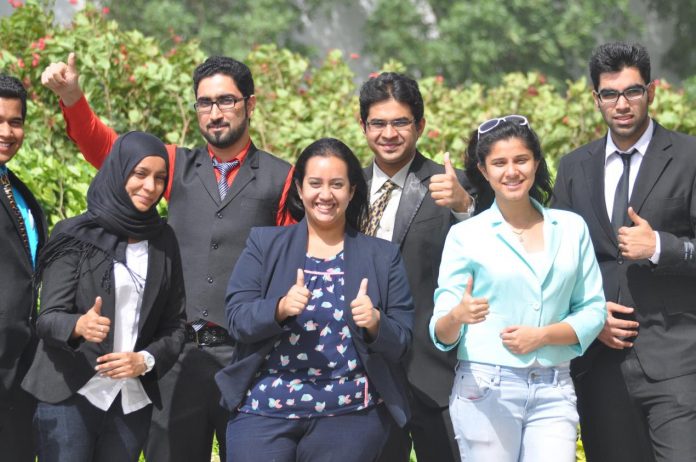
Favorable economic conditions, revised visa regulations, world-class educational facilities attract Indian students to UAE
Amidst the strengthening trade exchange between the UAE and India, Dubai’s higher education institutions have witnessed a continued rise in the number of Indian students.
The two countries have enjoyed long-standing close ties based on cultural, political, and commercial links. Lately, their relations have received fresh impetus with regular high-level bilateral visits.
As Dubai’s largest community dedicated to higher education, Dubai International Academic City (DIAC) experienced a surge in enrolment in 2018/2019 as a total of 27,500 students registered for the new academic year. The Indian nationality student population grew 62 per cent from 2012 to 2018 to 11,400 students.
Although India boasts one of the largest higher education systems in the world, even top academic performers face strong competition for university placements. Indian students are increasingly looking for leading educational institutions to pursue their tertiary education, not only in India but abroad as well. The UAE’s strategic location at the crossroads of East and West makes it a popular choice. Another factor that gives the country an edge is its proximity to India, with flights averaging around three hours.
The UAE has become a preferred destination for higher education due to revised visa regulations, quality of life, safety, and the cost-benefit advantage. Many leading Western universities in Dubai offer the same degrees as their home campuses, only with lower tuition rates and living expenses. It is also easier for students to secure long-term UAE visas, facilitating residency and employment in the country. This takes the time pressure off the job search for fresh graduates and, in turn, contributes to the retention of homegrown talent. In addition, the UAE ranked as the second safest country in the World Economic Forum’s Travel and Tourism Competitiveness Report 2017, boosting its credentials among tourists as well as transnational students.
Mohammad Abdullah, Managing Director of DIAC, said: “As the global landscape continues to shift, we must acknowledge the significant impact of India on the UAE and the wider region. India has one of the largest youth populations, and this is likely to drive growth within the education sector. With the rising numbers of students seeking international experience coupled with world-class education, we expect Indian student enrolment at DIAC campuses to continue its upward trajectory. Several Indian universities have already established a presence here, including Manipal Academy of Higher Education, BITS Pilani, Amity University Dubai, and the Institute of Management Technology (IMT) Dubai.”
Dr S. V. Kota Reddy, Academic President of Manipal Academy of Higher Education (MAHE), Dubai Campus was positive about the future outlook for Dubai as an education hub. He said: “It is encouraging to see the Indian transnational student market grow in the UAE. More and more Indian students are traveling to Dubai and MAHE has also benefited from the growth. Our legacy of offering an excellent education over six decades and the availability of on-campIndian Student Enrolment Figures Rise Across Dubai International Academic City Universitiesus student residences play an important role in attracting students from India.
“Moreover, the cross-cultural global exposure, the array of job opportunities, and the modern lifestyle that Dubai offers add significantly to increasing student uptake. It is interesting to find that apart from traditional streams of engineering and architecture, students are also opting for contemporary degrees in management and media and communication. The overall admission trends are positive and we look forward to the upcoming academic year.”
With a host of international universities and degrees to choose from, Dubai continues to strengthen its position as an educational hub, providing a safe environment and access to quality education for local and transnational students alike.
A market research study conducted by DIAC and BMI Media reveals that India and China are the leading sources of transnational students for universities. Notably, most of the higher education institutions surveyed view India as a faster growth market for international students in the next three years as compared to China, and plan to step up their marketing efforts in India over the next 12 months. The study also sheds light on the most popular subjects for international students, with business and management coming out on top, followed by engineering, accounting and finance, social sciences and politics, and science, technology, engineering and mathematiIndian Student Enrolment Figures Rise Across Dubai International Academic City Universitiescs (STEM).
In response to the surge in demand for STEM degrees that aligns with global trends, DIAC universities witnessed an increase in the number of STEM degrees, with a total of 142 degrees offered in the fields of Sciences, Technology, Engineering and Mathematics. The increase in demand for STEM programmes is in line with global trends where employment in STEM occupations grew at a much faster rate than employment in non-STEM occupations over the last decade, 24.4 percent versus 4.0 percent, respectively.
Dr R.N. Saha, Director of BITS Pilani, Dubai Campus, stated: “Programmes in engineering and technology have always been popular amongst Indian transnational students. BITS Pilani’s campus in DIAC is experiencing a surge in applicants from India, particularly in subjects such as computer science, electronics, mechanical engineering, chemical engineering and biotechnology. We offer many opportunities for students to interact with a large community of professors, industry experts and seasoned professionals.”
He added, “Dubai is home to over 200 nationalities and features a safe and secure environment which is perfect for educational tourism and fulfilling careers. The diverse range of higher education institutions is what makes DIAC an attractive destination for transnational students.”




































